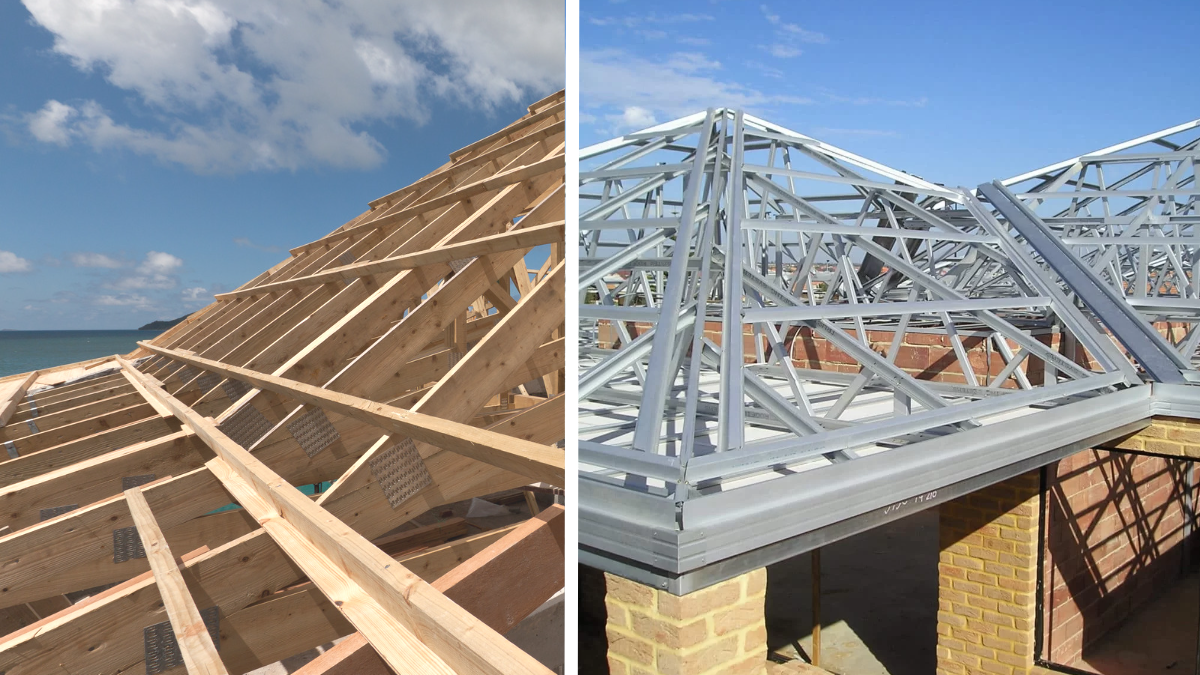Roof
TIMBER OR STEEL TRUSSES?
All structures must have adequate roof support. Whether you are constructing a residential or commercial building, it is important to select the right roof trusses for your project.
To help you make the choice between timber and steel roof trusses, we have prepared a simple guide. Steel is fast becoming a viable and more cost-effective alternative to traditional timber roof trusses.
Timber trusses
Timber trusses are a very popular type of roofing construction material because wood is generally more affordable than steel. Timber trusses can be installed much faster, saving time and resources.
But if you think that wood is the best roofing material for your home or building then think again. Wood has quite a few negative aspects you need to consider before you decide on this type of truss.
Timber trusses are often used in residential buildings since it seems economical and requires less labor and time to install.
Top Pros of Timber Trusses
- Seem more economical.
- Timber trusses can be installed much faster, saving time and resources.
- Minimal expertise requirements
- Strong material
- Ideal for the residential or small commercial markets.
Top Cons of Timber Trusses
- Timber is fuel to fire
- Timber is a natural material, it cannot stand up to the elements as well as steel.
- Timber trusses may warp over time.
- Vulnerable to water damage
- Wood is susceptible to insects such as termites
- Wood can rot or erode over time
- Timber isn’t as strong as steel
- Require chemical treatments such as pesticides to keep it in good condition
Steel trusses
Do it once, do it right.
Steel trusses are pre-engineered and are becoming increasingly popular in residential and commercial constructions. Although steel frame roof trusses require more skill to install, an experienced team should be able to fit your steel trusses quickly and efficiently.
Top Pros of Steel Trusses
- Superior quality and craftsmanship
- Long-lasting.
- Steel trusses are stronger
- No risk of ant or insect infestations
- Fire-resistant.
- Steel trusses are more economical for biggest spans.
- Steel is lightweight.
- Steel is pre-engineered and cut to length thus minimizing wastage.
- Chemical treatments aren’t needed to maintain the frame and insect infestations aren’t a risk.
- Does not warp, twist, sag, decompose or shrink.
- Steel isn’t vulnerable to rot.
- G550 Z275 galvanized structural steel has the highest protection against rust. Our steel battens are coated with Aluzinc, giving them additional protection ensuring that our steel frames are suitable for use even in coastal climates.
- Steel is a flexible product that can be used to create an infinite amount of roofing designs.
- Light Gauge Steel trusses optimize overall project costs because it is stronger than timber, this allows for fewer members and pre-engineered sizes cut down on wastage and reduce the labor demand and overall shorter project timelines.
Cons of Steel Trusses
- Steel trusses are slightly more expensive than wood in the beginning.
- A higher skill level is required for building and installing steel trusses
As you can see, steel trusses do win in terms of durability and functionality. We highly recommend you choose steel instead of wood for your upcoming development. We work with our partners to produce the best steel roof trusses using advanced design software and specialised machinery.
With our experienced partners and building teams at hand, you will receive a strong roofing structure that will last you a lifetime without the need to ever care and maintain your roof ever again. Whatever kind of steel framing you need, and whatever the size of the project, we have the expertise, equipment and supplies to deliver.
Mabati Yetu’s steel framing systems makes truss design to suit both residential and commercial applications from simple to very complex designs.


